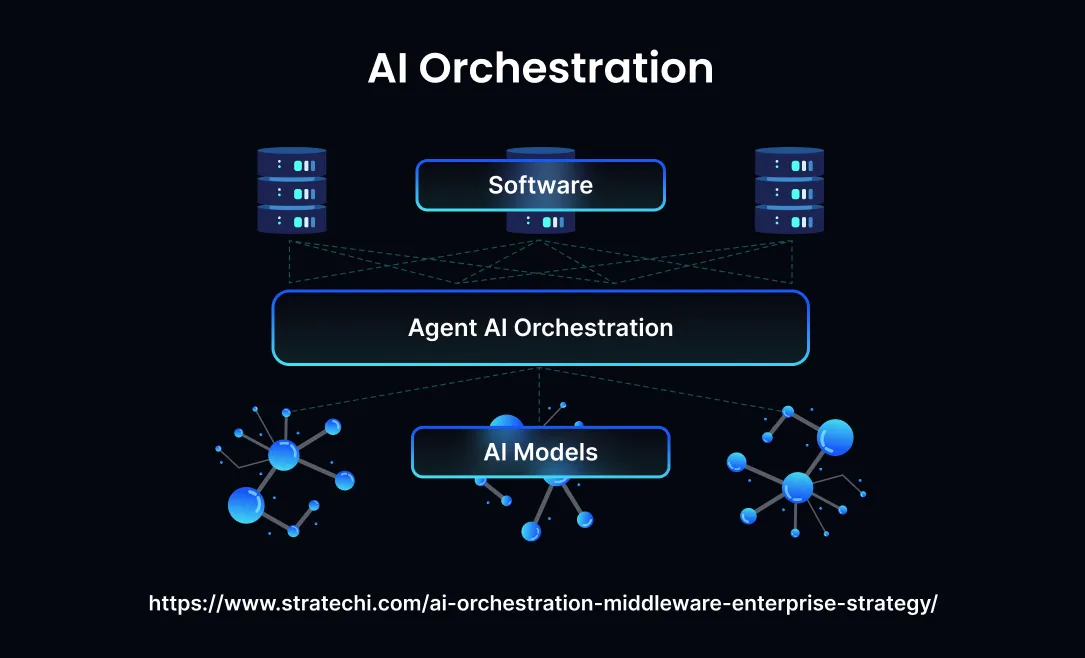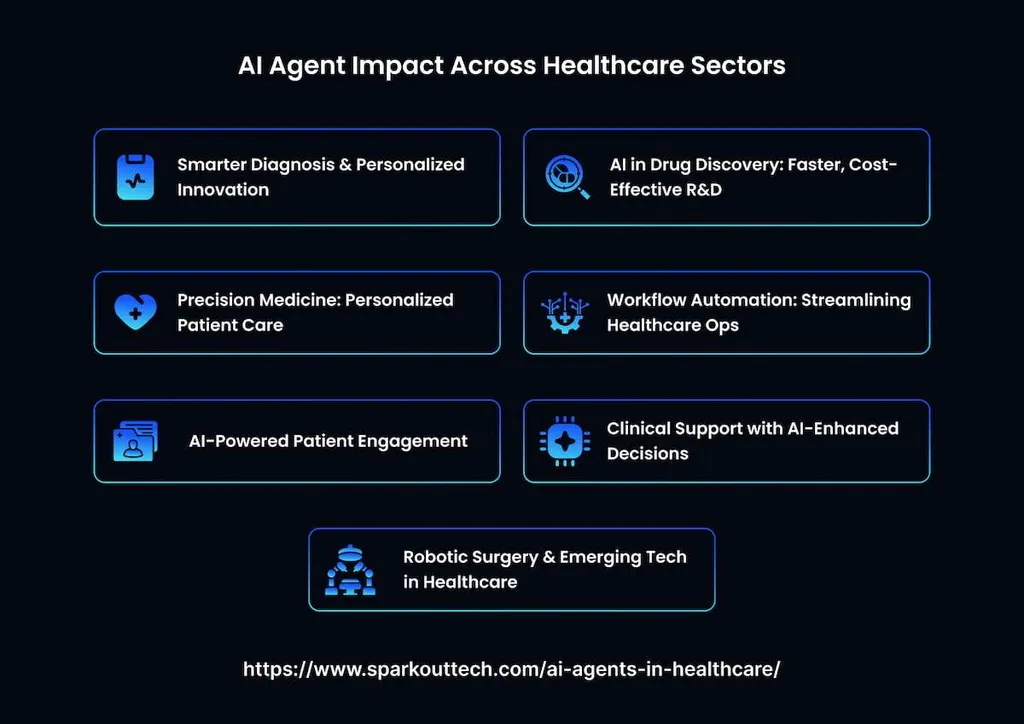Companies use AI agents across many industries, such as sales, tourism, IT, and finance. With proper adjustments, they can replace entire departments, while qualifying leads, monitoring supply chains, automating invoice processing, etc. But when expanding or shifting to automation, businesses deploy more agents, a new challenge emerges: their coordination. Without AI agent orchestration, you won’t achieve your goals as they’ll overlap, conflict, or slow each other down.
In this article, we’ll break down the concept of orchestration and why firms should wisely scale their use of autonomous systems.
Understanding How AI Agent Orchestration Works

Under the pressure of limited resources, companies adopt more AI tools, such as customer support, invoice processing, and sales data analysis, so the risk of chaos increases. Orchestration solves the problem of miscoordination by guaranteeing each agent knows what to do, what data to use, and how to interact with others. It acts as a central layer of logic that controls all agents and follows the following steps:
- Breaking down a larger task into smaller components, each suited to a different agent.
- Determining which agents are best equipped to handle each subtask.
- Exchanging information or passing tasks between one another. The AI orchestrator is responsible for managing the flow.
- Nonstop tracking performance, identifying errors, and adjusting assignments when needed.
You can choose between rule-based coordination, where workflows are predefined, and adaptive coordination, where the system adjusts based on context and performance. Both help lower delays, prevent failures, and ensure every task moves forward as planned.
Why Is Orchestration Critical?
Agentic AI systems have become more complex and multi-functional, and basic setups can no longer manage them effectively. Orchestration brings structure, coordination, and supervision to an environment that would otherwise be chaotic. Here are four key reasons why your business should consider implementing it:
- Scalability: When working with multi-agent systems (MAS), execution control allows businesses to handle more complex workflows because it is possible to divide tasks among several agents.
- Specialization: Instead of relying on a generalized AI system, thanks to orchestration, it is possible to deploy agents tailored to specific functions, such as data analysis, customer support, or content generation.
- Efficiency: Agents don’t duplicate efforts and handle tasks in parallel where possible. This allows us to allocate resources more rationally.
- Real-world applicability: Businesses often run multiple interconnected processes, and proper coordination enables seamless automation across departments or services.
Without internal system management, there is a chance that AI agents will become disorganized. They may operate in isolation, repeat the same tasks, or work against each other. This leads to wasted resources, slower response times, and inconsistent results. In customer service automation or financial operations, such misalignments can directly affect business performance.
Use Cases of AI Agent Orchestration
It is already assisting companies to run their operations, making everyday processes faster and more connected. Firms get streamlined workflows, reduce human error, and react faster to shifting conditions. Here are several practical examples of where orchestration delivers real value:
E-commerce Automation
Online retailers implement multiple AI tools to manage daily tasks. One agent processes buying behavior to customize recommendations, another adjusts pricing depending on fresh market data, while others check inventory levels or automate customer service support. Without coordination, all of them may get confused and fail, leading in lost opportunities or conflicting situations.
For example, if the inventory agent flags a product as out of stock but the pricing agent continues to promote it, the result is a poor customer experience. Orchestration ensures seamless communication. When stock levels change, the promotion is paused, the chatbot is updated with accurate product availability, and the logistics agent adjusts forecasts. The business gets a cohesive operation that saves time, avoids customer frustration, and increases conversions.
Financial Services
In the fintech area, accuracy, speed, and compliance are critical. AI agents are now used here for transaction monitoring, fraud detection, customer onboarding, document processing, and regulatory compliance. Orchestration organizes adequate flow. If a suspicious transaction is detected, the system will automatically pause it, launch a fraud analysis agent, notify the compliance department, and trigger a customer verification request. Such a kind of automated coordination lowers manual workload, minimizes the risk of oversight, and improves response time.
IT Operations
IT departments choose AI agents for system monitoring, incident response, ticket triage, and infrastructure scaling. However, these agents are effective when they operate in sync. Suppose a server failure is detected. The system will automatically trigger a root cause analysis, reroute traffic to backup servers, alert the appropriate teams, and log the incident, all within seconds. Without orchestration, the process might involve multiple handoffs and delays.
As you can see, this level of automation significantly lowers downtime, boosts system reliability, and enables IT teams to focus on higher-level tasks.
Healthcare and Patience Experience

Healthcare providers often deal with fragmented systems where one part is responsible for appointments, another for diagnostics, and another for billing. Orchestrated AI offers a streamlined experience for both patients and staff.
When a patient books a visit to a specialist, the system initiates several actions. It may retrieve the patient’s medical history, notify the diagnostic assistant to prepare relevant tools or scans, and alert the billing system to generate a pre-visit estimate.
After the visit, the documentation agent summarizes the consultation, sends follow-up instructions, and updates insurance records. The aim is to save time while simultaneously improving the quality of care and communication. Experience orchestration turns fragmented touchpoints into a unified customer experience.
Marketing and Content Production
Marketing departments often utilize a mix of AI tools, from content generation and campaign management to email automation and customer segmentation. With orchestration in place, AI agents that generate content align with the current campaign objectives, audience preferences, and real-time performance data. Using retrieval augmented generation (RAG), they access up-to-date information from internal and external sources, ensuring the content is relevant. The emails are sent at optimal times through automated email agents, and engagement metrics are fed back to adjust messaging on the fly.
This creates a feedback loop where every component works toward a single marketing goal. The result is higher engagement, reduced workload, and more impactful campaigns.
Challenges and Considerations
AI agent orchestration has strategic upsides, but it also introduces new complexities that businesses must address to make it effective. Let’s look at them:
- Integration issues: Connecting different AI agents requires bridging gaps between tools with different architectures, data formats, or APIs. Without proper integration, agents may fail to work together.
- Data quality: Coordinated systems require sound, real-time data. Incomplete or inconsistent information can lead to poor decisions and unreliable outcomes.
- Lack of visibility: When multiple agents function simultaneously, it can be challenging to track their actions or spot errors. Clear monitoring, regular checks, and control mechanisms are essential.
- Security risks: Coordinating agents means giving them access to more systems and data. Without strict access controls, businesses can face vulnerabilities accompanied by data leaks.
- Skills: Orchestration requires a shift in how teams work and think about automation. Specialists may need new skills, training, and clear guidance during implementation.
While these challenges are real, they can be managed with the right planning and tools. A thoughtful approach helps businesses use the full potential of AI agent orchestration without creating unnecessary risk.
Final Thoughts
AI agents are changing how businesses operate, but without orchestration, their potential is limited. As you implement more tools to handle specialized tasks, the need for coordination becomes critical. Orchestration ensures that agents work together rather than in isolation, making operations faster, more flexible and easily scalable.
Automation requires a structured and reliable approach. Companies that take control of their AI systems through orchestration will avoid costly inefficiencies and be better prepared for growth and unexpected changes.
At MetaDialog, we design and implement AI solutions that actually strengthen your business and customer support service. If you’re ready to bring structure to your automation strategy, we’re here to help you get started.
